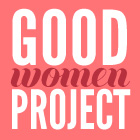I say women “in” history because Misty is still hot on the scene of ballet, so I can’t say that she’s faded into the woodwork of history yet. But she did make history and she will be remembered. Because she is talented and beautiful and smart and groundbreaking and she has such a great attitude. She inspires me so much. She is doing great things and will continue to do great things.
She
- was only the third African American female soloist for the American Ballet Theatre.
- was also the first African American female soloist in twenty years for American Ballet Theatre.
- didn’t start learning ballet until the age of 13 and yet became super successful anyways.
- started en pointe three months later. (This might not mean a lot to you, but en pointe is hard, really hard. I used to be a ballerina and I never made it there. For more on it, here’s the Wikipedia article.)
- played Clare in The Chocolate Nutcracker.
- has toured in China.
- has had many roles in famous shows.
- has had some crossover work in music videos.
- gives back to the community.
- has the possibility of becoming the first African American female principal dancer at American Ballet Theatre.
- is developing her own product line of dance wear made to fit people of all shapes and sizes.
Others said
- “It’s not like she’s going, ‘Hey, look at me.’ But she can be so ethereal, you just have to.” – Craig Salstein.
- “I am a huge fan of Misty Copeland! She is not only a phenomenal ballet dancer, but she is intelligent, driven, and such an inspiration to me, and millions of dancers all over the world. She beat the odds, and is living her dream, in spite of so many challenges. She is the epitome of the type of dancer my show was created to spotlight, and represent. I’m honored to have her on our radio show!” – Ashani Mfuko
She said
- “The challenges of being one of the few black women in this field, gave me this determination not to give up.”
- “It’s just so important to see that it’s possible and to see that someone can make it. Now that I’m here, I can set an example and hopefully make things easier for the next black [ballet] dancer.”
- “Some black women give up and don’t do classical ballet dance. I want them to know that times are changing. The more people we have auditioning, they can’t deny talent.”
Awards
- Los Angeles Spotlight Award
- Best Young Dancer in the Greater Los Angeles Area
- ABT’s National Coca Cola Scholar
- Leonore Annenberg Fellowship in the Arts
Misty’s website can be found here. Her twitter is here. Her Facebook page is here.
There’s so much more of her personality that I don’t know how to include without copying and pasting whole interviews with her. I really like these interviews with her to get a feel for what a cool person she is.
- Misty Copeland On Prince and the Curvy Ballerina Revolution
- Exclusive Interview: Misty Copeland Talks About Being A Curvy Black Ballerina
- 5 Things Ballet Dancer Misty Copeland Knows For Sure
- Art Talk with Ballerina Misty Cropland
If you have kids, I highly recommend the book she’s written called Firebird. It is a beautiful book and especially if your kids are interested in dance is a great read-aloud.
Sources (Not already mentioned)


















